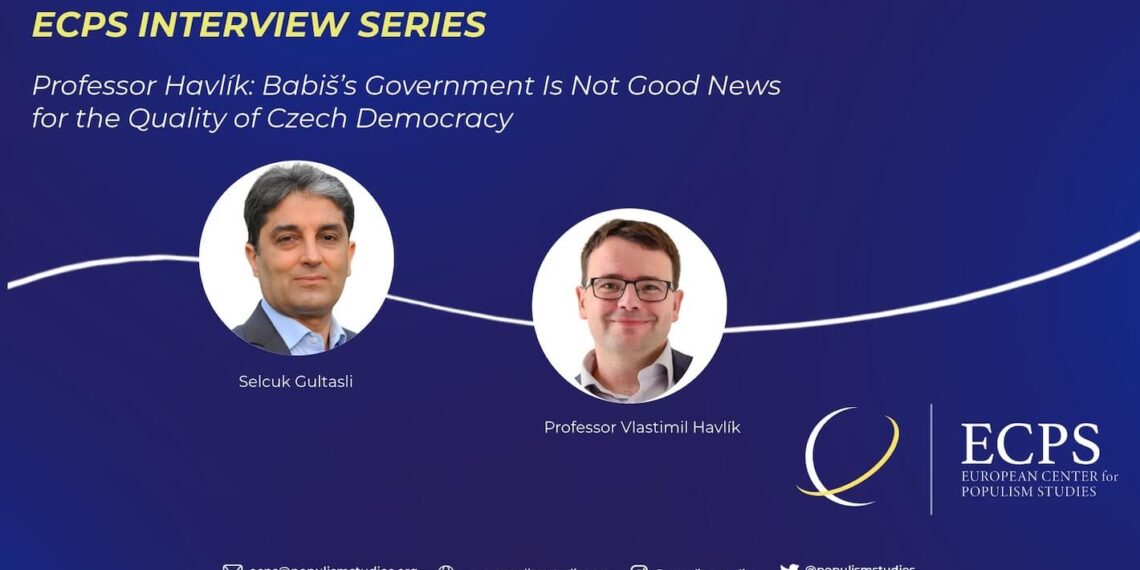Professor Vlastimil Havlík warns that the incoming Babiš government “is not good news for the quality of Czech democracy.” Although constitutional majorities are “very unlikely,” he predicts “a slower, incremental decrease in the quality of democracy” through politicization of public service media, weakening of liberal civil society, and the conflation of private business and state power. He describes ANO’s victory as “a consolidation of the illiberal space” and emphasizes that probable coalition partners like the Motorists and SPD share “hostile rhetoric toward NGOs” and key democratic institutions. Strategically, ANO now pursues “a soft version of Euroscepticism,” aligning with median voter preferences while maintaining a pragmatic, catch-all profile.
Interview by Selcuk Gultasli
On October 4, 2025, billionaire populist Andrej Babiš’s ANO party won the Czech parliamentary elections with just under 35% of the vote, securing 80 of 200 seats—an increase from the previous election. Although short of a majority, Babiš is expected to lead coalition talks. His most likely allies are two small right-wing, Eurosceptic parties: the anti-Green Deal Motorists for Themselves and Tomio Okamura’s anti-immigrant Freedom and Direct Democracy (SPD). While ANO shares the Motorists’ opposition to EU emissions targets, relations with the SPD may prove more complicated due to internal divisions and radical demands. A new Babiš government would likely shift Czech foreign policy, notably by scrapping the Czech ammunition initiative supporting Ukraine.
In a wide-ranging interview with the European Center for Populism Studies (ECPS), Professor Vlastimil Havlík, a leading expert on Czech party politics and populism at Masaryk University and the SYRI National Institute, analyses the electoral outcome and its implications for Czech democracy. He argues that ANO’s 2025 victory represents “a consolidation of the illiberal space,”with the party securing record electoral support and aligning with far-right forces, but without the constitutional majorities that enabled Hungary’s Fidesz to overhaul the political system. Despite this, Professor Havlík warns that the incoming government “is not good news for the quality of Czech democracy.”
According to Professor Havlík, Babiš’s coalition arithmetic now depends on “Eurosceptic and far-right actors such as the Motorists and SPD,” making stable governance uncertain but also potentially dangerous. He cautions that their shared hostility toward public service media and liberal civil society could translate into concrete measures to weaken democratic institutions: “We may see attempts to limit the role and funding of public service media, or even to take it over,” he says. “There has also been very hostile rhetoric from the three parties toward NGOs… essentially liberal, left-leaning civil society organizations.”
Professor Havlík also highlights structural constraints that differentiate the Czech case from Hungary and Poland. A majoritarian Senate system and the presidency of Petr Pavel make constitutional majorities for populists “very unlikely.” Yet he foresees a “slower, incremental decrease in the quality of democracy” through piecemeal institutional changes, politicization of media oversight, and the blurring of boundaries between Babiš’s private business empire and the state.
Economically, Professor Havlík emphasizes continuity. ANO’s electoral base resembles that of the former Social Democrats, with strong support in peripheral regions suffering from economic stagnation. Strategically, the party has embraced “a soft version of Euroscepticism” and aligned itself with the “Patriots for Europe” group, adapting its discourse to a skeptical public while avoiding the radical Czexit positions of SPD.
In sum, Professor Havlík sees both continuity and transformation: ANO has evolved from centrist populism into a dominant illiberal force, constrained by institutions but poised to erode liberal democratic checks incrementally.


